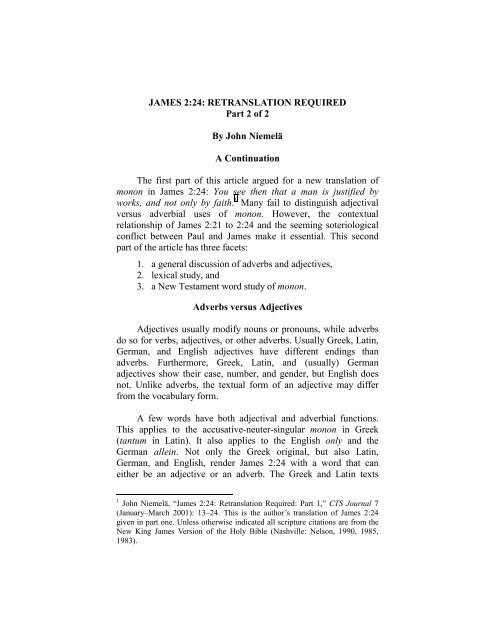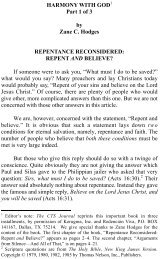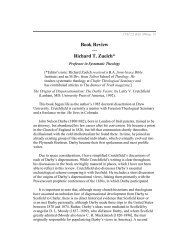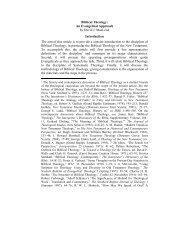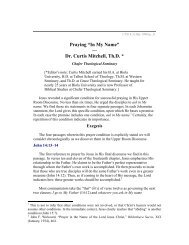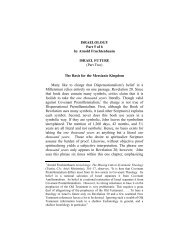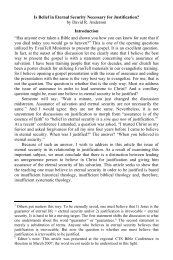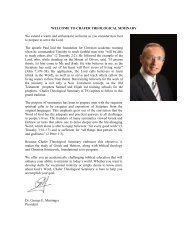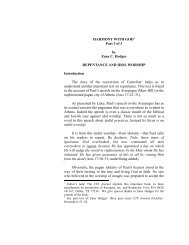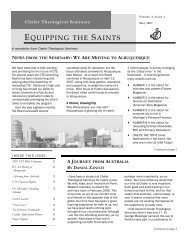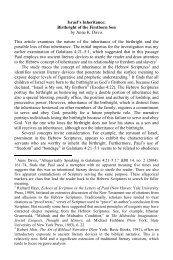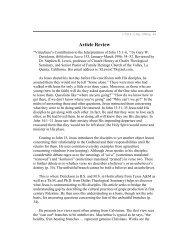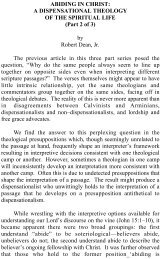JAMES 2:24 - Chafer Theological Seminary
JAMES 2:24 - Chafer Theological Seminary
JAMES 2:24 - Chafer Theological Seminary
Create successful ePaper yourself
Turn your PDF publications into a flip-book with our unique Google optimized e-Paper software.
<strong>JAMES</strong> 2:<strong>24</strong>: RETRANSLATION REQUIRED<br />
Part 2 of 2<br />
By John Niemelä<br />
A Continuation<br />
The first part of this article argued for a new translation of<br />
monon in James 2:<strong>24</strong>: You see then that a man is justified by<br />
works, and not only by faith. 1 Many fail to distinguish adjectival<br />
versus adverbial uses of monon. However, the contextual<br />
relationship of James 2:21 to 2:<strong>24</strong> and the seeming soteriological<br />
conflict between Paul and James make it essential. This second<br />
part of the article has three facets:<br />
1. a general discussion of adverbs and adjectives,<br />
2. lexical study, and<br />
3. a New Testament word study of monon.<br />
Adverbs versus Adjectives<br />
Adjectives usually modify nouns or pronouns, while adverbs<br />
do so for verbs, adjectives, or other adverbs. Usually Greek, Latin,<br />
German, and English adjectives have different endings than<br />
adverbs. Furthermore, Greek, Latin, and (usually) German<br />
adjectives show their case, number, and gender, but English does<br />
not. Unlike adverbs, the textual form of an adjective may differ<br />
from the vocabulary form.<br />
A few words have both adjectival and adverbial functions.<br />
This applies to the accusative-neuter-singular monon in Greek<br />
(tantum in Latin). It also applies to the English only and the<br />
German allein. Not only the Greek original, but also Latin,<br />
German, and English, render James 2:<strong>24</strong> with a word that can<br />
either be an adjective or an adverb. The Greek and Latin texts<br />
1 John Niemelä, “James 2:<strong>24</strong>: Retranslation Required: Part 1,” CTS Journal 7<br />
(January–March 2001): 13–<strong>24</strong>. This is the author’s translation of James 2:<strong>24</strong><br />
given in part one. Unless otherwise indicated all scripture citations are from the<br />
New King James Version of the Holy Bible (Nashville: Nelson, 1990, 1985,<br />
1983).
James 2:<strong>24</strong>: Retranslation Required 3<br />
clearly convey that the word has an adverbial sense here.<br />
Unfortunately, the English and German treat it as an adjective.<br />
Greek Monon and Latin Tantus<br />
Each form in the following paradigm has adjectival uses.<br />
Only the neuter-accusative-singular can be an adverb. Two purelyadjectival<br />
parsings (the masculine-accusative-singular and the<br />
neuter-nominative-singular) share this form. If the sentence lacks a<br />
substantive that can agree with monon, it is adverbial. If it contains<br />
such a substantive, juxtaposing monon and the substantive makes it<br />
adjectival.<br />
Paradigm for the Greek Adjective<br />
Masculine Feminine Neuter<br />
Sing. Plu. Sing. Plu. Sing. Plu.<br />
Nom. monos monoi monh monai monon<br />
mona<br />
Gen. monou monwn monhs monwn monou monwn<br />
Dat. monw monois monh monais monw monois<br />
Acc.<br />
monon monous monhn monas monon<br />
mona<br />
Latin resembles Greek here. The accusative-neuter-singular,<br />
tantum, can be adjectival or adverbial.<br />
Paradigm for Adjectives in Latin<br />
Masculine Feminine Neuter<br />
Sing. Plu. Sing. Plu. Sing. Plu.<br />
Nom. tantus tantī tanta tantae tantum<br />
tanta<br />
Gen. tantī tantōrum tantae tantārum tantī tantōrum<br />
Dat. tantō tantīs tantae tantīs tantō tantīs<br />
Acc.<br />
tantum tantōs tantam tantās tantum<br />
tanta<br />
Voc. tante tantī tanta tantae tantum<br />
tanta<br />
Abl. tantō tantīs tantā tantīs tantō tantīs
4<br />
CTS Journal 7 (April–June 2001)<br />
The German Allein and the English Only<br />
The German allein and the English only serve adjectivally for<br />
any case, gender, and number. They can also be adverbial. Word<br />
order differentiates adjectival and adverbial uses.<br />
Illustrating Greek and Latin<br />
Consider the following simple sentence, “Esqiw arton” (I<br />
eat fruit) or “Esqiw artous” (I eat fruits). The translation alone<br />
is adjectival, but only is adverbial. The potential for ambiguity is<br />
less than with either English or German (see below). Only the fifth<br />
sentence is ambiguous. Word order is only important in the two<br />
sentences with asterisks.<br />
1. Monos esqiw karpon (I alone eat fruit) 2<br />
2. Esqiw monos karpon (I alone eat fruit)<br />
3. Esqiw karpon monos (I alone eat fruit)<br />
4. Monon esqiw karpon (I only eat fruit)*<br />
5. Esqiw monon karpon (I alone eat fruit, or I only eat fruit)<br />
6. Esqiw karpon monon (I eat fruit alone)*<br />
7. Monon esqiw karpous (I alone eat fruits)<br />
8. Esqiw monon karpous (I alone eat fruits)<br />
9. Esqiw karpous monon (I alone eat fruits)<br />
Illustrating English and German<br />
Only appears in different positions within a simple sentence<br />
(following). When paraphrased as alone it is an adjective, but<br />
solely signifies that it is adverbial. Two of four examples are<br />
ambiguous (more often than in Latin or Greek).<br />
Only I eat bread (I alone eat bread)<br />
I only eat bread (I alone eat bread; I solely eat bread)<br />
I eat only bread (I alone eat bread; I solely eat bread)<br />
I eat bread only (I solely eat bread)<br />
2 The implied subject is nominative-singular egw (“I”), so monos (masculinenominative-singular)<br />
agrees with the subject.
James 2:<strong>24</strong>: Retranslation Required 5<br />
Lexical Study<br />
The outline of BDAG’s pertinent adjectival uses follows:<br />
1. adj.—a. only, alone—a. used w. [stative] verbs. . . . 3<br />
b. used w. a noun [as an attributive adjective]. . . . 4<br />
g. w. a negative and w. ajllav foll. . . . 5<br />
d. movno" qeov". . . . the only God. . . .<br />
b. alone, deserted, helpless. . . . 6<br />
c. isolated, by itself. . . . 7<br />
Each of BDAG’s adjectival classifications involves attributive<br />
or predicate adjectives. Both require the adjective and its<br />
substantive to agree in case, number, and gender. Only the<br />
accusative-neuter-singular form (monon) can function adverbially.<br />
3 Daniel B. Wallace, Greek Grammar Beyond the Basics: An Exegetical Syntax<br />
of the New Testament (Grand Rapids: Zondervan, 1996), 40, explains that “the<br />
passives of some transitive verbs” act as stative verbs in predicate nominative<br />
clauses. Robertson, Grammar, 656, “As further interesting examples of the<br />
predicate adjective, note. . . movno" (Lu. <strong>24</strong>:8; cf. Mt. 14:23), etc.”<br />
4 BDAG, 658, lists John 6:22 as an example. Monos here is attributive: His<br />
disciples alone had gone away.<br />
5 Ibid., 658, cites Matthew 4:4: Man shall not live by bread alone, but by every<br />
word that proceeds from the mouth of God. F. Blass and A. Debrunner, A Greek<br />
Grammar of the New Testament and Other Early Christian Literature, trans. and<br />
rev. Robert W. Funk (Chicago: University of Chicago Press, 1961), 233,<br />
“Ouj. . . ajlla also means ‘not so much. . . as’ in which the first element is not<br />
entirely negated, but only toned down. . . .” Man lives by more than bread alone.<br />
6 This is a double accusative of object and complement. Wallace, Grammar,<br />
182, says that in this construction “one accusative substantive is the direct object<br />
of the verb and the other accusative (either noun, adjective, participle, or<br />
infinitive) complements the object in that it predicates something about it. The<br />
complement may be substantival or adjectival [emphasis mine].” Ibid., 184,<br />
indicates that a complementary adjective here is always a predicate adjective.<br />
Ibid., also says, “. . .one should normally translate the construction with ‘as,’ ‘to<br />
be,’ or ‘namely’ between the two accusatives.” BDAG, 659, gives John 8:29 as<br />
an example: The Father has not left Me [to be] alone.<br />
7 BDAG’s only example is John 12:<strong>24</strong>: it [a grain of wheat] remains alone. This<br />
resembles a predicate adjective. The verb menw (“remains”) may function as a<br />
stative verb (cf. Wallace, Grammar, 40, n. 11).
6<br />
CTS Journal 7 (April–June 2001)<br />
Word Study<br />
The New Testament has 114 uses of monos. 8 They belong to<br />
various categories.<br />
Separating Monon from other Forms<br />
The appendix lists all seventy-three occurrences of the form<br />
monon. Only accusative-neuter examples can be adverbial.<br />
Nominative or masculine versions are adjectival. The seven<br />
passages with masculine uses of monon must be adjectival. The<br />
underlined words (below) are accusative masculine adjectives.<br />
They saw no one but Jesus alone (Matthew 17:8)<br />
They saw no one anymore, but Jesus alone (Mark 9:8)<br />
The Father has not left Me alone (John 8:29)<br />
You. . . will leave Me alone (John 16:32a)<br />
They may know You, the only true God (John 17:3)<br />
He will have rejoicing in himself alone (Galatians 6:4)<br />
Ungodly men who deny the only Lord God (Jude 1:4)<br />
These adjectival classifications are not controversial.<br />
Robertson, 9 BDAG, 10 and Moulton-Geden 11 so classify them.<br />
Matthew 17:8 and Mark 9:8 are adjectival, because the<br />
meaning of monon “w. eij mhv after a neg. not. . . except. . . alone” 12<br />
resembles examples using adjectival forms of monos. Both verses<br />
juxtapose monon with the noun, not the verb.<br />
8 The Critical Text and Majority Text agree, but the Textus Receptus substitutes a<br />
compound word katamonas for kata monas (Mark 4:10; Luke 9:18). It adds<br />
monous in Revelation 9:4. These plural forms do not affect adverbial uses.<br />
9 Robertson, Grammar, 657, classifies Matthew 17:8; Mark 9:8; John 16:32.<br />
Ibid., 549, classifies John 8:29. Ibid., 776, classifies John 17:3 and Jude 1:4. He<br />
does not classify Galatians 6:4.<br />
10 BDAG, 658–59, classifies Matthew 17:8; Mark 9:8; John 8:29; 16:32a; 17:3;<br />
Galatians 6:4; and Jude 1:4.<br />
11 W. F. Moulton and A. S. Geden, A Concordance to the Greek Testament, 5th<br />
ed. (Edinburgh: Clark, 1978), 657, lists all seven passages under movno" (monos,<br />
adjectival). Ibid., 656, lists adverbial uses under movnon (monon).<br />
12 BDAG, 658.
James 2:<strong>24</strong>: Retranslation Required 7<br />
John 16:32b supports BDAG’s adjectival classification of<br />
John 8:29 and 16:32a. The former has monos (masculine), but the<br />
others use monon (masculine or neuter).<br />
16:32b: I am not alone (monos), because the Father is with Me<br />
8:29: The Father has not left Me alone (monon)<br />
16:32a: You. . . will leave Me alone (monon)<br />
John 16:32b is a simple predicate adjective. The subject I<br />
refers to Jesus (masculine), so alone (monos) is masculine. John<br />
16:32b is a predicate adjective, so 16:32a is a double accusative of<br />
object and complement 13 (similar to a predicate adjective).<br />
8:29: The Father has not left Me [to be] alone (monon)<br />
16:32a: You. . . will leave Me [to be] alone (monon)<br />
Thus, John 16:32 means that: When the disciples forsake<br />
Christ, He would be (humanly) alone, but not completely alone<br />
(because of the Father). John 8:29 parallels 16:32a.<br />
John 17:3 and Jude 1:4 illustrate the attributive adjective. The<br />
adjective is close to its matching substantive.<br />
The word order of Galatians 6:4 most naturally places monon<br />
within a prepositional phrase eis heauton monon (“in himself<br />
alone”), rather than modifying the verb (distant from it).<br />
In all seven of these verses both the NKJV and the NASB<br />
place alone or only in the adjectival position (next to the noun), not<br />
in the adverbial position. These are adjectival. John 12:9 may also<br />
use the masculine accusative adjectivally.<br />
Adjectival:<br />
Adverbial:<br />
They came, not because of Jesus alone [masculine<br />
accusative], but that they might also see Lazarus.<br />
They came, not only [neuter accusative] because of<br />
Jesus, but that they might also see Lazarus.<br />
13 Ibid., 659, gives John 8:29 as an example of the double accusative of object<br />
and complement: The Father has not left Me [to be] alone.
8<br />
CTS Journal 7 (April–June 2001)<br />
BDAG, Robertson, and Moulton-Geden correctly favor<br />
taking monon adverbially, but neither option affects the overall<br />
meaning of John 12:9. 14 Sixty-six uses remain candidates for<br />
adverbial usage.<br />
Unambiguous Adverbial Uses<br />
This article has isolated accusative-neuter-singular forms.<br />
How does one distinguish adverbial uses Any sentence containing<br />
monon that lacks an accusative-neuter-singular substantive<br />
necessarily uses it adverbially. The first chart of the next two charts<br />
identifies definitely adverbial uses. The second contains ones that<br />
are possibly adverbial (requiring further analysis).<br />
Definitely Adverbial Uses (42)<br />
Matthew 5:47; 8:8; 9:21; 14:36; Mark 5:36; Luke 8:50; John 13:9;<br />
17:20; Acts 19:26; 26:29; 27:10; Romans 3:29; 5:3, 11; 8:23; 9:10, <strong>24</strong>;<br />
13:5; 1 Corinthians 7:39; 15:19; 2 Corinthians 7:7; 8:19, 21; 9:12;<br />
Galatians 1:23; 4:18; 5:13; 6:12; Ephesians 1:21; Philippians 1:27;<br />
2:12; 1 Thessalonians 1:5; 2 Thessalonians 2:7; 1 Timothy 5:13;<br />
2 Timothy 2:20; Hebrews 9:10; 12:26; James 1:22; 2:<strong>24</strong>; 1 Peter 2:18;<br />
1 John 2:2; 5:6.<br />
Possibly Adverbial Uses (<strong>24</strong>)<br />
Matthew 10:42; 21:19, 21; Mark 6:8; John 5:18; 11:52; 12:9; Acts<br />
8:16; 11:19; 18:25; 19:27; 21:13; Romans 1:32; 4:12, 16, 23;<br />
2 Corinthians 8:10; Galatians 2:10; 3:2; Philippians 1:29; 2:27;<br />
1 Thessalonians 1:8; 2:8; 2 Timothy 4:8.<br />
Moulton and Geden classify all sixty-six references as<br />
adverbial. 15 BDAG categorizes sixty-three of the sixty-six as<br />
14 Both BDAG, 659; Moulton and Geden, Concordance, 656, classify John 12:9<br />
as adverbial.<br />
15 Moulton and Geden, Concordance, 656.
James 2:<strong>24</strong>: Retranslation Required 9<br />
adverbial. 16 Robertson and Blass-Debrunner each classify several<br />
adverbial examples from these (giving no adjectival examples). 17<br />
Simple concordance study reduces the potentially adjectival<br />
uses of monon from sixty-six to twenty-four. These contain<br />
substantives that might agree with an adjectival monon.<br />
The Final Twenty-Four<br />
The mere presence of a noun that could agree with monon<br />
does not prove adjectival usage. Further analysis is necessary.<br />
Matthew 10:42<br />
Bruce Metzger observes, “. . . Matthew uses the adverb<br />
movnon seven times; Mark, twice; Luke, once).” 18<br />
Whoever only gives one of these little ones a cup of cold water to<br />
drink in the name of a disciple, assuredly, I say to you, he shall by<br />
no means lose his reward (Matthew 10:42).<br />
16 BDAG, 658–59. Ibid., 658, classifies Romans 4:23 as adjectival. It does not<br />
classify Acts 11:19 or 2 Timothy 4:8.<br />
17 Robertson, Grammar, 657, classifies Matthew 8:8; Acts 21:13; 1 John 5:6<br />
adverbially. Ibid., 549, does so for Luke 8:50. Ibid., 659, calls Galatians 1:23<br />
adverbial. Blass-Debrunner, Grammar, 126, classifies Acts 11:19; 1 Timothy<br />
5:13; 2 Timothy 4:8; Hebrews 12:26; and James 1:22 as adverbial.<br />
18 Bruce M. Metzger, A Textual Commentary on the Greek New Testament<br />
(N.p.: United Bible Societies, 1971), 28. Earlier (page 6) this article showed that<br />
Matthew 17:8 and Mark 9:8 are adjectival. Metzger’s tally of ten adverbial uses<br />
in Matthew, Mark, and Luke agrees with this author’s counts.<br />
Adverbial<br />
Adjectival<br />
Matthew 5:47; 8:8; 9:21; 10:42; 4:4, 10; 12:4; 14:23;<br />
14:36; 21:19, 21 7 17:8; 18:15; <strong>24</strong>:36 7<br />
Mark 5:36; 6:8 2 4:10; 6:47; 9:2, 8 4<br />
Luke 8:50<br />
+ 1<br />
4:4, 8; 5:21; 6:4; 9:18,<br />
36; 10:40; <strong>24</strong>:12, 18 + 9<br />
10 20
10<br />
CTS Journal 7 (April–June 2001)<br />
The word order of Matthew 10:42 is a bit ambiguous. Monon<br />
does not lie next to the verb and a genitive separates it from the<br />
accusative-neuter-singular noun. It could modify the noun or the<br />
verb. Before choosing the word closer to monon, another factor is<br />
pertinent. An adverbial phrase, in the name of a disciple, follows<br />
monon. Although that phrase is further from gives. . . to drink than<br />
monon, still modifies the verb. The person gives a drink in the<br />
name of a disciple. Adjectival use of monon is possible, but it<br />
seems adverbial: One merely showing Christian hospitality<br />
(nothing more) will have eternal reward.<br />
Acts 8:16 and 18:25<br />
In Acts 8:16 monon precedes de (“but”) as the first word in its<br />
clause, because de can never be initial. Thus, monon is as close to<br />
the verb as possible, but as far as possible from to onoma (“the<br />
name”). It is adverbial.<br />
[The Holy Spirit] had fallen upon none of them, but they had only<br />
been baptized in the name of the Lord Jesus (Acts 8:16).<br />
Acts 18:25 sets monon between the verb and its direct object:<br />
epistamenos monon to baptisma Iwannou (“only knowing<br />
John’s baptism”). Monon is neither attributive nor predicate to to<br />
baptisma. It is adverbial.<br />
[Apollos] taught accurately the things of the Lord, though he only<br />
knew the baptism of John (Acts 18:25).<br />
Matthew 21:19; Acts 11:19; and Mark 6:8<br />
Ouden (“nothing”) could formally agree with monon<br />
(Matthew 21:19). Yet, it lies outside of the clause containing ei<br />
mh. . . monon (“except only”). Monon is adverbial.<br />
He found nothing on it [the fig tree] except only leaves.
James 2:<strong>24</strong>: Retranslation Required 11<br />
Acts 11:19 has ton logon (“the word”), which could (under<br />
other circumstances) agree with monon. No form agrees with<br />
monon, so it adverbially modifies the verb.<br />
Now those who were scattered. . . traveled. . . preaching the word<br />
to no one but only the Jews (Acts 11:19).<br />
Mark 6:8 uses the same ei mh. . . monon (“except only”)<br />
phrase as Matthew 21:19. It also resembles the ei mh monon of<br />
Acts 11:19. In those passages, monon was necessarily adverbial,<br />
because the only accusative-neuter-singular substantive was<br />
outside of the target phrase. Here, the substantive lies within it: ei<br />
mh rabdon monon (“except only a staff”).<br />
He commanded them to take nothing for the journey except only a<br />
staff—no bag, no bread, no copper in their money belts— but to<br />
wear sandals, and not to put on two tunics (Mark 6:8–9).<br />
Word order alone cannot decide this. However, the ei mh. . .<br />
monon construction is an established adverbial usage.<br />
Adverbial Usages With Negatives<br />
Sixteen of the twenty-four remaining candidates belong to<br />
one of BDAG’s adverbial subcategories: “. . . used w. negatives:<br />
. . . ouj (or mh;). . . m., ajllav kai; not only. . . , but also. . .” 19<br />
1. You will not only do what was done to the fig tree, but also. . . it<br />
[removing the mountain] will be done (Matthew 21:21b).<br />
2. He not only broke the Sabbath, but also said that God was His<br />
Father (John 5:18).<br />
3. Jesus would die for the nation, and not only for that nation, but<br />
also that He would gather together. . . . (John 11:51–52).<br />
4. They came, not only because of Jesus, but also that they might<br />
see Lazarus (John 12:9).<br />
5. Not only is this trade of ours in danger of falling into disrepute,<br />
but also the temple. . . may be despised (Acts 19:27).<br />
19 BDAG, 659.
12<br />
CTS Journal 7 (April–June 2001)<br />
6. I am ready not only to be bound, but also to die at Jerusalem<br />
for the name of the Lord Jesus (Acts 21:13).<br />
7. Those who practice such things are deserving of death, not only<br />
do the same but also approve of those who practice them<br />
(Romans 1:32).<br />
8. [Abraham is] the father of circumcision to those who not only<br />
are of the circumcision, but who also walk in the steps of the<br />
faith [of Abraham] (Romans 4:12).<br />
9. The promise might be sure to all the seed, not only to those who<br />
are of the law, but also to those who are of the faith of<br />
Abraham. . . . (Romans 4:16)<br />
10. It was not written for his sake alone. . . , but also for us<br />
(Romans 4:23–<strong>24</strong>).<br />
11. It is to your advantage not only to be doing what you began and<br />
were desiring to do a year ago; but now you also must<br />
complete the doing of it (2 Corinthians 8:10–11).<br />
12. I do not only pray for these, but also for those who will believe<br />
in Me through their word (John 17:20).<br />
13. Our gospel not only came to you in word, but also in power,<br />
and in the Holy Spirit and in much assurance (1 Thessalonians<br />
1:5).<br />
14. In a great house there are not only vessels of gold and silver,<br />
but also of wood and clay, some for honor and some for<br />
dishonor (2 Timothy 2:20).<br />
15. He Himself is the propitiation for our sins, and not for ours<br />
only but also for the whole world (1 John 2:2).<br />
16. This is He who came by water and blood—Jesus Christ; not<br />
only by water, but by water and blood (1 John 5:6).<br />
Six (of sixteen with this construction) separate the negative<br />
from monon. They are still adverbial. None has a substantive for<br />
which monon could be a predicate or attributive adjective.<br />
1. Jesus would die for the nation, and not only for that nation, but<br />
also that He would gather together . . . (John 11:51–52).<br />
2. I do not only pray for these, but also for those who will believe in<br />
Me through their word (John 17:20).<br />
3. Our gospel not only came to you in word, but also in power, and<br />
in the Holy Spirit and in much assurance (1 Thessalonians 1:5).
James 2:<strong>24</strong>: Retranslation Required 13<br />
4. In a great house there are not only vessels of gold and silver, but<br />
also of wood and clay, some for honor and some for dishonor (2<br />
Timothy 2:20).<br />
5. He Himself is the propitiation for our sins, and not for ours only<br />
but also for the whole world (1 John 2:2).<br />
6. This is He who came by water and blood—Jesus Christ; not only<br />
by water, but by water and blood (1 John 5:6).<br />
James 2:<strong>24</strong> resembles the six (and the sixteen). The difference<br />
is that it does not have alla (“but”). Despite a separation of the<br />
negative and monon, the verse contains no word that can agree<br />
with monon in case-gender-number. It is adverbial, as are the<br />
preceding six examples. Thus, the following translation is<br />
untenable:<br />
A man is justified by works, and not by faith only.<br />
Rather, the word only is adverbial.<br />
A man is justified by works, and not only [justified] by faith.<br />
This in turn is more easily understood as:<br />
A man is not only justified by faith, but also by works.<br />
Conclusion<br />
The Greek is perfectly clear: Monon in James 2:<strong>24</strong> is an<br />
adverb. The translation ought to be: You see then that a man is not<br />
only justified by faith, but also by works. Thus, James speaks of<br />
two justifications: one by faith (before God) and another by works<br />
(before men). This is quite consistent with verses 21 and 23. Verse<br />
21 signals that he had two justifications: Was not Abraham our<br />
father justified by works when he offered Isaac his son on the<br />
altar The question expects an affirmative answer. Verse 23a<br />
indicates the fulfillment of Genesis 15:6: Abraham believed God,<br />
and it was accounted to him for righteousness. Thus, verse 23a<br />
speaks of Abraham’s justification by faith. Verse 23b indicates the
14<br />
CTS Journal 7 (April–June 2001)<br />
fulfillment of a second Old Testament truth: And he was called the<br />
friend of God (2 Chronicles 20:7 and Isaiah 41:8). Verse 23b<br />
speaks of that justification by works before men. In other words,<br />
an adverbial translation of monon is quite consistent with context.<br />
On the other hand, both the German and the English have<br />
missed the clear adverbial sense of the Greek (and even the Latin).<br />
These translations do not continue the sense of verses 21 and 23.<br />
Rather, they introduce the foreign notion of a single justification<br />
by two criteria: faith plus works. It is time to abandon<br />
ecclesiastical tradition and allow James to make his point<br />
unhindered: Abraham had two distinct justifications. James wants<br />
his readers to also have a second justification. When Christians use<br />
the doctrine that they believe, they gain a testimony with people.<br />
James 2:15–16 show that ministry to people cannot happen unless<br />
we are justified by works in their eyes.<br />
Appendix<br />
Monon<br />
The form monon appears seventy-three times in the New<br />
Testament. This pool contains both adjectival and adverbial uses.<br />
Matthew 5:47; 8:8; 9:21; 10:42; 14:36; 17:8; 21:19, 21; Mark 5:36; 6:8;<br />
9:8; Luke 8:50; John 5:18; 8:29; 11:52; 12:9; 13:9; 16:32a; 17:3, 20; Acts<br />
8:16; 11:19; 18:25; 19:26, 27; 21:13; 26:29; 27:10; Romans 1:32; 3:29;<br />
4:12, 16, 23; 5:3, 11; 8:23; 9:10, <strong>24</strong>; 13:5; 1 Corinthians 7:39; 15:19; 2<br />
Corinthians 7:7; 8:10, 19, 21; 9:12; Galatians 1:23; 2:10; 3:2; 4:18; 5:13;<br />
6:4, 12; Ephesians 1:21; Philippians 1:27, 29; 2:12, 27; 1 Thessalonians<br />
1:5, 8; 2:8; 2 Thessalonians 2:7; 1 Timothy 5:13; 2 Timothy 2:20; 4:8;<br />
Hebrews 9:10; 12:26; James 1:22; 2:<strong>24</strong>; 1 Peter 2:18; 1 John 2:2; 5:6;<br />
Jude 1:4.<br />
Forms other than Monon<br />
Forty-one (or forty-two) uses of monos appear in forms that<br />
have non-adverbial usage. These are strictly adjectival.
James 2:<strong>24</strong>: Retranslation Required 15<br />
Matthew 4:4, 10; 12:4; 14:23; 18:5; <strong>24</strong>:36; Mark 4:10* CT/MT ; 6:47; 9:2;<br />
Luke 4:4, 8; 5:21; 6:4; 9:18* CT/MT , 36; 10:40; <strong>24</strong>:12, 18; John 5:44; 6:15,<br />
22; 8:9, 16; 12:<strong>24</strong>; 16:32b; Romans 11:3; 16:4, 27; 1 Corinthians 9:6;<br />
14:36; Philippians 4:15; Colossians 4:11; 1 Thessalonians 3:1; 1 Timothy<br />
1:17; 6:15, 16; 2 Timothy 4:11; Hebrews 9:7; 2 John 1:1; Jude 1:25;<br />
Revelation 9:4 TR ; 15:4.<br />
—End—<br />
John Niemelä received a B.A. (University of Minnesota), and<br />
earned the Th.M. and Ph.D. degrees in New Testament Literature<br />
and Exegesis from Dallas <strong>Theological</strong> <strong>Seminary</strong>. John is<br />
Professor of Hebrew and Greek at <strong>Chafer</strong> <strong>Theological</strong> <strong>Seminary</strong>.<br />
His email address is language@chafer.edu.


